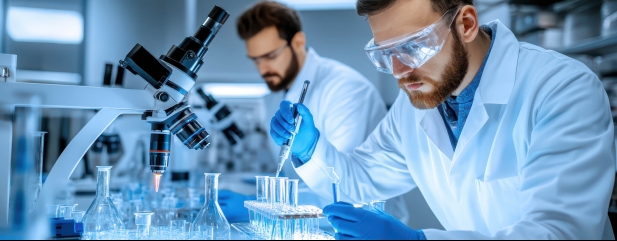Archived article
Please note that tax, investment, pension and ISA rules can change and the information and any views contained in this article may now be inaccurate.
A rare opportunity to buy high-quality antibody specialist Bioventix on the cheap

Bioventix (BVXP:AIM) £24.11
Market cap: £127.9 million
Opportunities to buy high quality businesses at knock-down prices do not come along every day. We believe specialist antibody maker Bioventix (BVXP:AIM) now falls into this camp.
Over the last year Bioventix shares have halved, taking the one-year forward PE (price to earnings) ratio down to 16 times from 29 times.
Bioventix is known as more of a growth than an income stock, but the depressed share price means the shares today offer an attractive 6.4% dividend yield.
The company’s cash generative business model has allowed it to grow the dividend by an annualised 16% a year over the last five years.
To put that into a longer-term context, since moving to AIM in April 2014, the company has paid shareholders a cumulative £11.73 in dividends per share.
Why then have the shares fallen out of favour? We suspect they have been caught between the crosshairs of UK smaller companies enduring weak market sentiment and AIM stocks being clobbered following changes to the inheritance tax rules.
At the same time 2024 has seen a hiatus in terms of growth. At the half year results to 31 March, the company reported a 4% fall in pre-tax profit to £5.1 million, reflecting increased investments on new projects.
The company said full year revenue to 30 June is expected to be flat with pre-tax profit slightly lower on the year. This is expected to be temporary, with a return to growth in 2026 driven by new products contributing a higher proportion of group revenues.
WHAT DOES BIOVENTIX DO?
Bioventix creates and manufactures SMAs (sheep monoclonal antibodies) which are used in diagnostic applications. The company has built a reputation for creating superior antibodies which confer improved diagnostic test performance.
The company sells liquid antibodies and derives royalty revenues from their downstream use.
Antibody-based blood tests are used to help diagnose many different conditions including, among others, heart disease, thyroid function, fertility, infectious disease and cancer.
Bioventix has built a portfolio of roughly 30 antibodies that are sold globally to large multinational laboratory diagnostics companies.
HIGH BARRIERS TO ENTRY
It takes about a year for Bioventix to create a new antibody. It can take a further two to four years for customers to conduct field trials, submit regulatory data and obtain marketing approval.
Assuming the resulting antibody works as untended, the long development time and expense creates a natural incentive for customers to continue using a Bioventix antibody.
This creates an effective barrier to entry for potential replacement antibodies. It also means the company has a dependable revenue stream from existing products.
A HIGH-QUALITY STABLE BUSINESS
The company’s predominately royalty-based revenue and capital light business model mean a high proportion of revenue is translated into operating cash.
In 2024 the company generated £8.3 million of operating cash, representing 54% of revenues.
Gross margins (gross profit minus cost of sales) are above 90% while operating margins have averaged 77% over the last five years. The company operates with 12 full-time employees and has 14 staff in total, which keeps costs low.
For context, a typical gross margin for a UK company is around 50% and a mid-teens operating margin is considered healthy.
It is not surprising that the business generates a healthy return on equity which has averaged 65% over the last five years.
The company is debt free and had roughly £5 million of cash on the balance sheet at the end of March 2025.
WHAT ABOUT GROWTH?
Given the long lead times to develop new antibodies, the company is constantly researching new applications for its technology.
Bioventix has been working with the University of Gothenburg since early 2020 to develop antibodies for use in Alzheimer’s disease diagnostics. The prevailing view is that blood-testing machines will soon offer new neurological tests which reveal important information about brain health.
Another promising area of growth is the environment. The company has developed a lateral flow system for industrial biomonitoring to detect sewage contamination of rivers and lakes.
Drugs like paracetamol and caffeine have previously been used as a surrogate marker of sewage in waterways.
Bioventix has made antibodies which can be used in lateral flow tests to facilitate rapid riverside tests, the results of which can be uploaded and shared with many parties.
In summary, we believe the depressed share price offers investors a great opportunity to get on board a quality growth business.
Important information:
These articles are provided by Shares magazine which is published by AJ Bell Media, a part of AJ Bell. Shares is not written by AJ Bell.
Shares is provided for your general information and use and is not a personal recommendation to invest. It is not intended to be relied upon by you in making or not making any investment decisions. The investments referred to in these articles will not be suitable for all investors. If in doubt please seek appropriate independent financial advice.
Investors acting on the information in these articles do so at their own risk and AJ Bell Media and its staff do not accept liability for losses suffered by investors as a result of their investment decisions.
Issue contents
Editor's View
Feature
Great Ideas
News
- Housing services provider Mears hits five-year high on ’beat-and-raise’
- Weak US market and operational difficulties sink TT Electronics stock
- Tesco shares drop on fears it will launch ‘price war’ to raise market share
- Can Relx maintain its strong performance in the first quarter?
- Is this the end of the road for Tesla bulls?
- After discovery bright spot for BP what next for UK energy giants?
- Markets recover some poise after tariff U-turn
 magazine
magazine








